Take the First Step For Estimate!
- Accurancy
- Efficiency
- Transparency
- Customization
- Time Saving
- Professionalism
- Cost Control
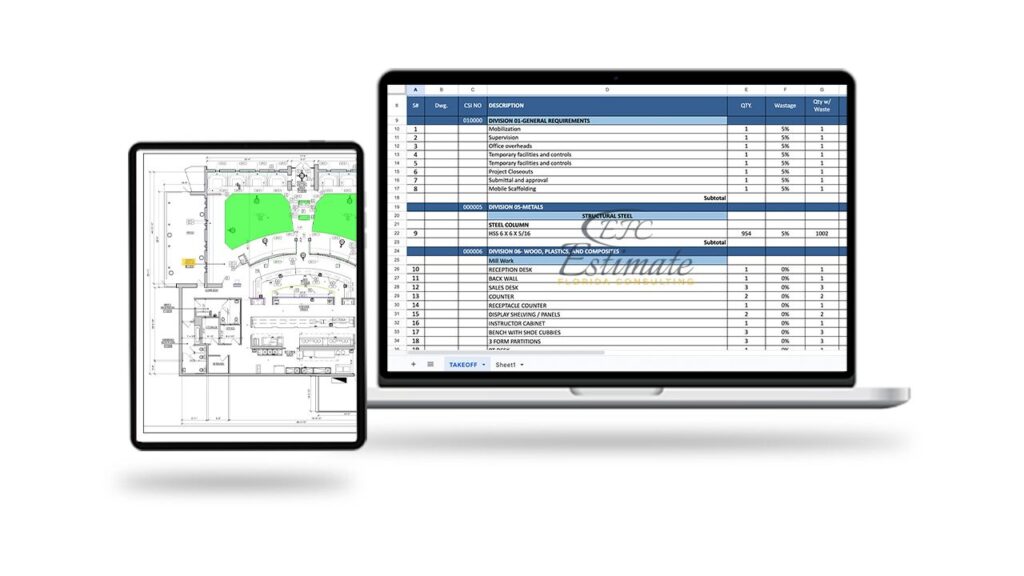
At Estimate Florida Consulting, we specialize in providing comprehensive estimates for solar roofing projects tailored specifically for warehouse buildings.Solar roof shingles typically range from $50,400 to $96,000+ on average before tax credits. The cost of solar roofing tiles falls between $25 and $48 per square foot installed or $4.80 to $16.80 per watt, depending on various factors such as brand, style, roof size, complexity, and kW required. Solar shingles generally come at a higher cost compared to traditional solar panels.
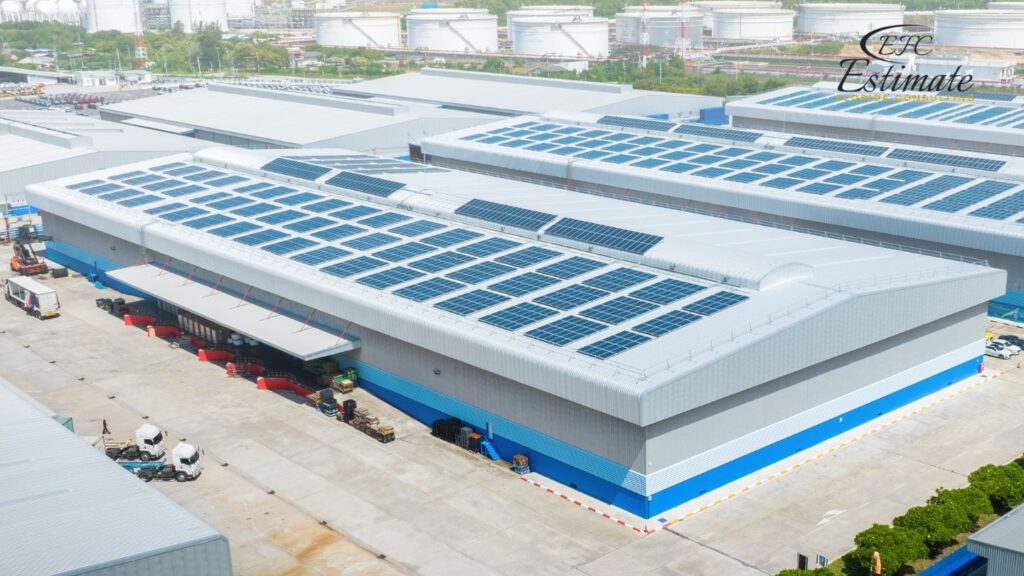
With our reliable estimates, clients can explore the possibilities of solar roofing and embark on a sustainable energy journey with confidence.

The table outlines the estimated costs for solar roofing projects based on the size of the roof in square feet. Solar roofing offers a sustainable and energy-efficient solution for warehouses, reducing reliance on traditional energy sources and lowering utility expenses over time. By harnessing solar energy through rooftop panels, warehouse owners can contribute to environmental conservation while enjoying long-term savings on electricity bills. Each warehouse’s unique specifications and energy needs will influence the final cost of the solar roofing project.
Roof Size (square feet) | Average Cost Installed |
1,000 | $25,200 – $48,000+ |
1,500 | $37,800 – $72,000+ |
2,000 | $50,400 – $96,000+ |
2,500 | $63,000 – $120,000+ |
3,000 | $75,600 – $144,000+ |
3,500 | $88,200 – $168,000+ |
Solar panel installation typically ranges from $12,000 to $36,000+ on average before tax credits or incentives. While traditional solar panels are generally less expensive than solar shingles, they offer higher efficiency and generate more wattage, making them a popular choice for many homeowners seeking to harness solar energy.
Roof Size (square feet) | Solar Panels (installed cost) |
1,500 | $13,920 – $19,680+ |
2,000 | $18,600 – $26,280+ |
2,500 | $23,280 – $32,880+ |
3,000 | $27,960 – $39,480+ |
The journey towards solarizing a warehouse roof begins with a thorough evaluation of the available roof space and its condition. This step is pivotal because it sets the foundation for the entire project. The roof space must be assessed to determine its suitability for solar panel installation. Factors such as the angle, orientation, and structural integrity of the roof play a crucial role in deciding whether it can support solar panels efficiently and safely.
Another essential consideration during this phase is the solar irradiance of the location. Solar irradiance measures the amount of solar power received per unit area. It is a critical factor in determining the potential effectiveness of a solar roofing system. Areas with higher solar irradiance receive more sunlight and are therefore more conducive to solar energy generation. This information is vital for estimating the potential energy output of the solar system and calculating the project’s feasibility.
Determining the right system size is a fundamental aspect of a successful solar roofing project. This step typically involves engaging a professional solar installer or engineer who can conduct a comprehensive assessment. The assessment aims to calculate the total energy consumption of the warehouse and recommend a system capacity that aligns with its energy demand and roof space constraints.
The assessment takes into account factors like the warehouse’s historical energy usage, peak demand, and seasonal variations.
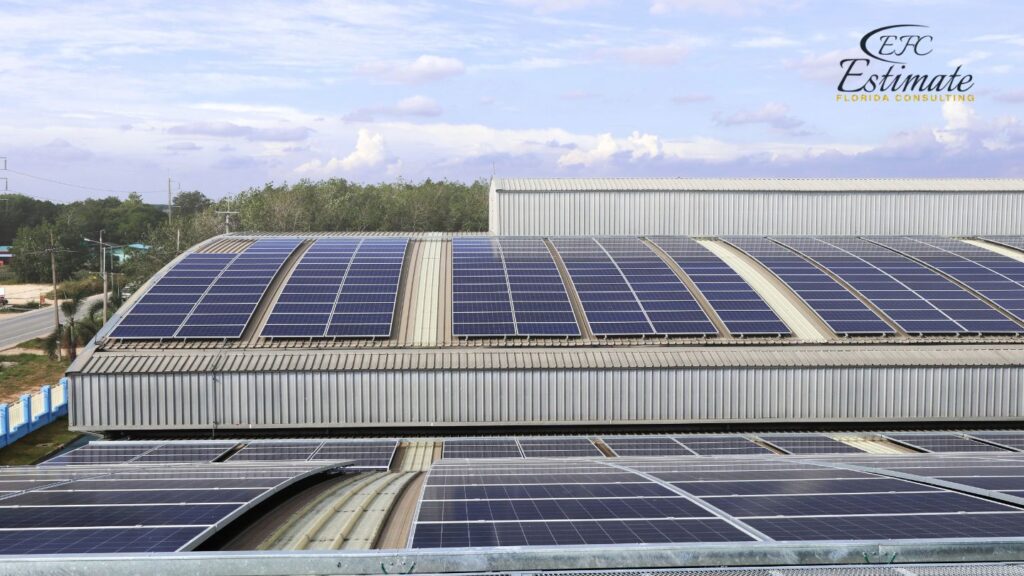
It also considers the available roof space and its orientation to optimize the solar panel layout. The goal is to design a system that can generate sufficient electricity to meet the warehouse’s energy needs while ensuring that it doesn’t exceed the roof’s capacity or compromise its structural integrity.
Solar inverters vary in cost depending on factors such as brand, capacity, and features. These devices are essential components of solar power systems as they convert the DC (direct current) electricity generated by solar panels into AC (alternating current) electricity suitable for use in homes or businesses.
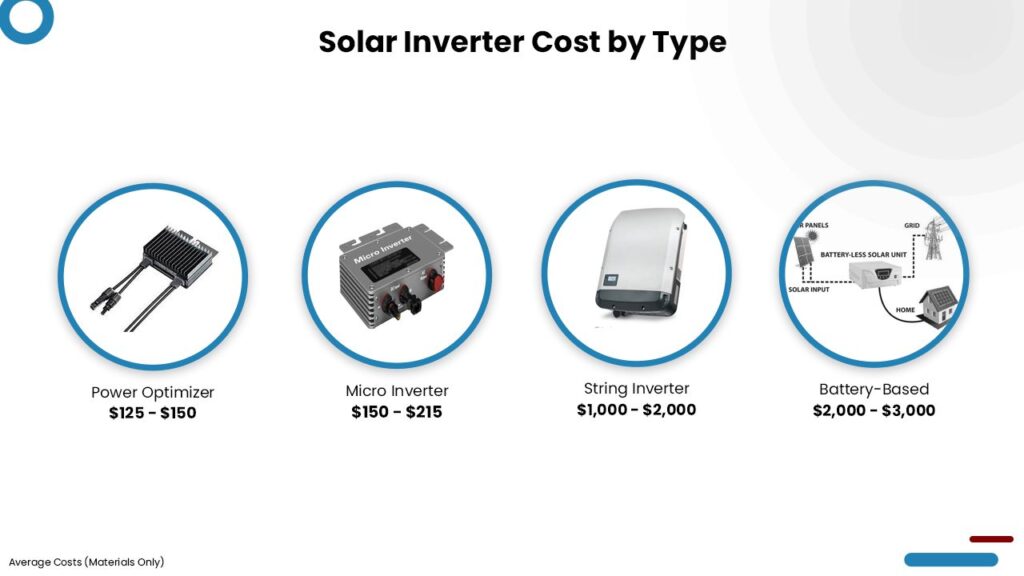
Choosing the right components, such as high-quality solar panels, inverters, and mounting systems, is crucial for a successful solar roofing project. Consider factors like panel efficiency, durability, and warranty when selecting components that fit your budget and project requirements.
Selecting an experienced and reputable solar installation contractor is essential, especially for commercial projects. Look for contractors with a proven track record in commercial installations, certifications, and the ability to meet your project’s specific needs. They can help you navigate regulations and ensure a professional installation.
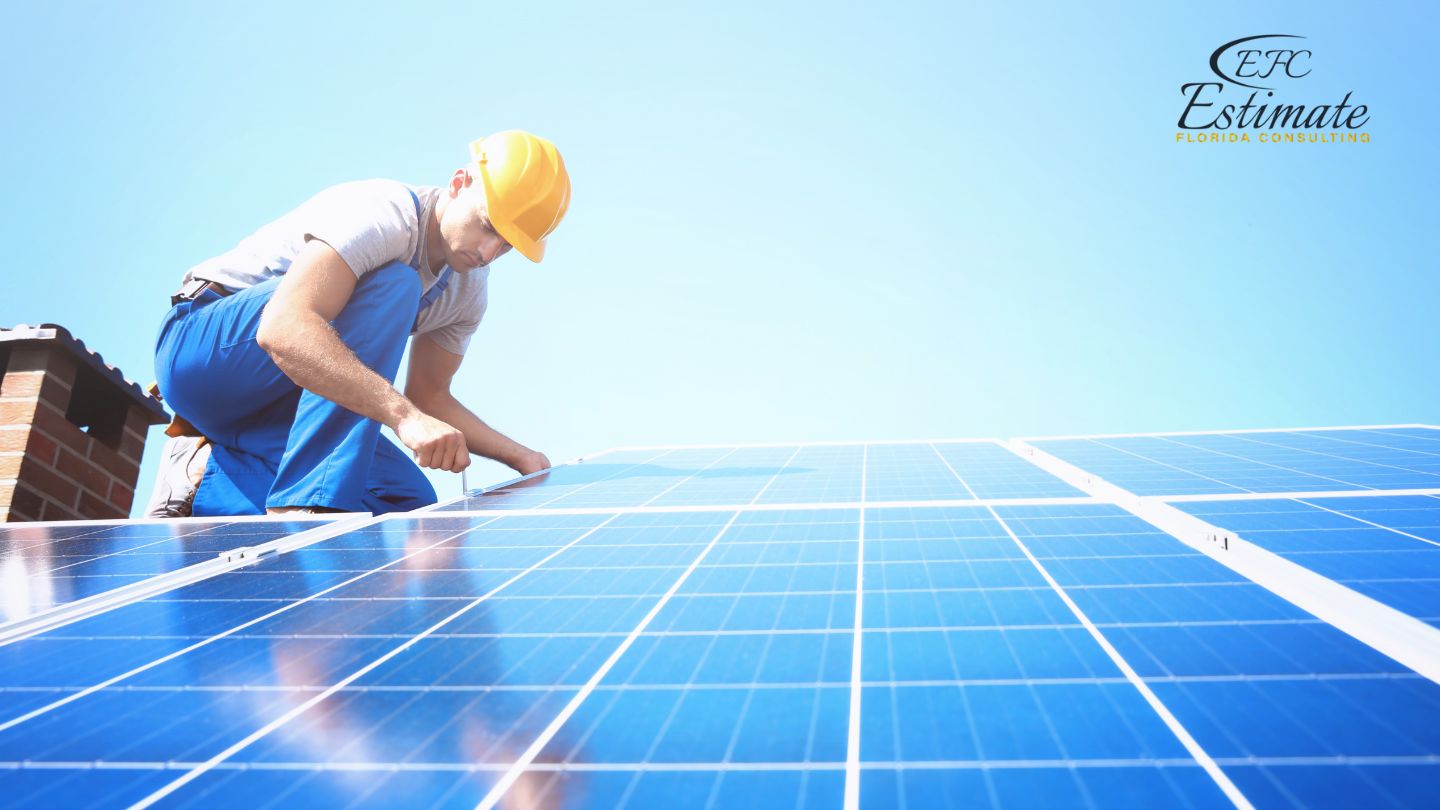
Fully Insured License Hire Sub-Contractor for Warehouse Solar Roofing
Hire Contractor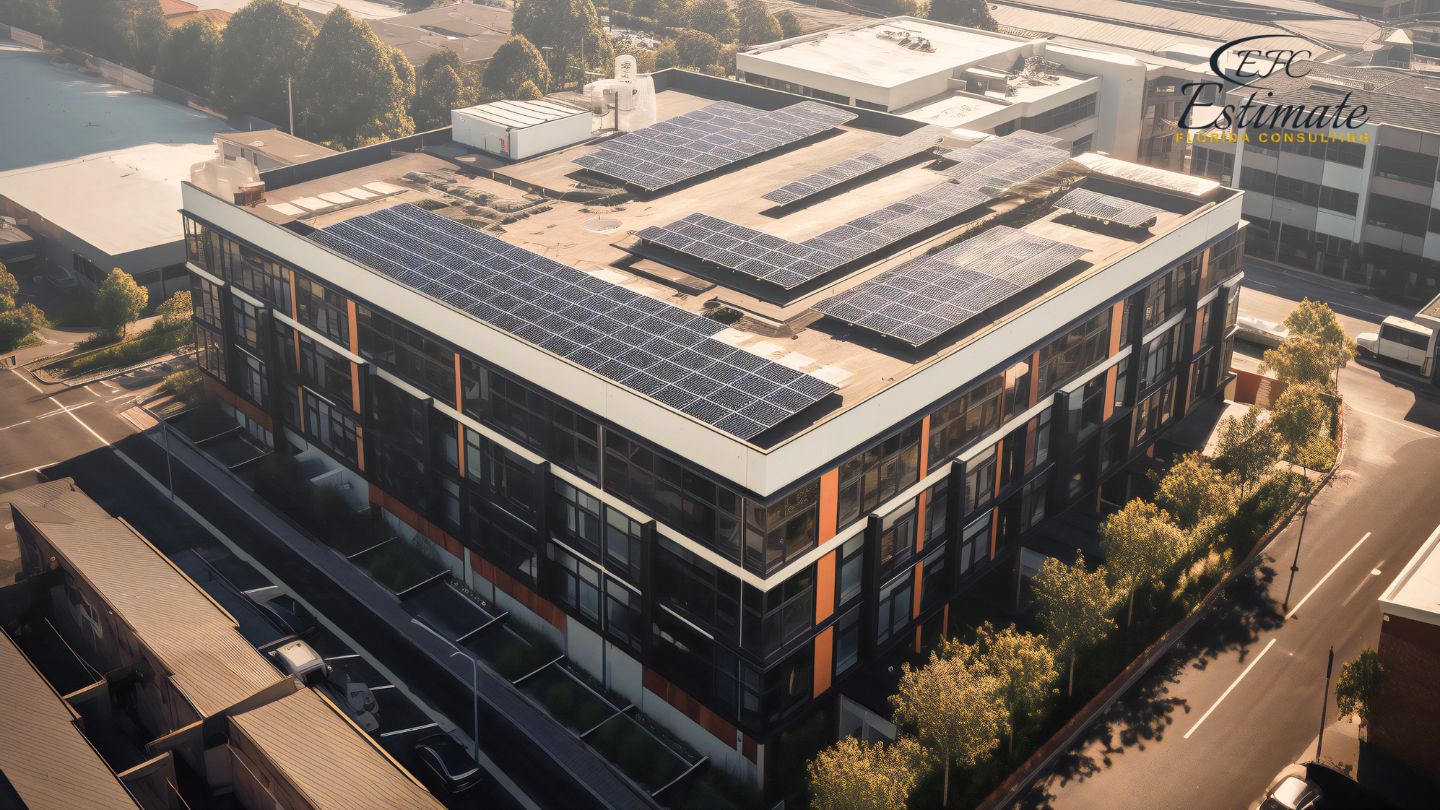
Make Informed Design Decisions Showcase Your Design Ideas
Get RenderingUnderstanding and complying with local permits and regulations is a vital step to ensure the legal and safe installation of your solar roofing system. Working closely with your chosen contractor can simplify this process, as they are well-versed in navigating the permitting and regulatory landscape.
Professional and meticulous installation of solar panels, inverters, and mounting systems is critical for the system’s long-term efficiency and safety. Experienced installers follow industry best practices, adhere to safety protocols, and conduct regular inspections to verify the system’s proper functioning.
Implementing a monitoring and maintenance plan is essential after installation. Regular monitoring helps track the system’s performance, while maintenance tasks like cleaning panels, inspecting connections, and ensuring the mounting system’s security ensure the system operates at peak efficiency and longevity.
The financial benefits of solar roofing for warehouses extend beyond immediate electricity bill savings. The return on investment and payback period, often within a few years, make solar roofing a financially viable project. Environmentally, the reduction in CO2 emissions and the sustainable generation of electricity contribute significantly to eco-friendly business practices.
Regular inspections are an essential component of solar roofing system maintenance. These inspections serve as a proactive measure to ensure the continued efficiency and safety of the system. It is highly recommended that inspections be conducted at least once a year, although more frequent checks may be advisable depending on environmental conditions and the system’s age.
During these inspections, various aspects of the solar roofing system are evaluated. This includes a thorough examination of the solar panels to identify any signs of physical damage, such as cracks or chips, which could compromise their functionality.
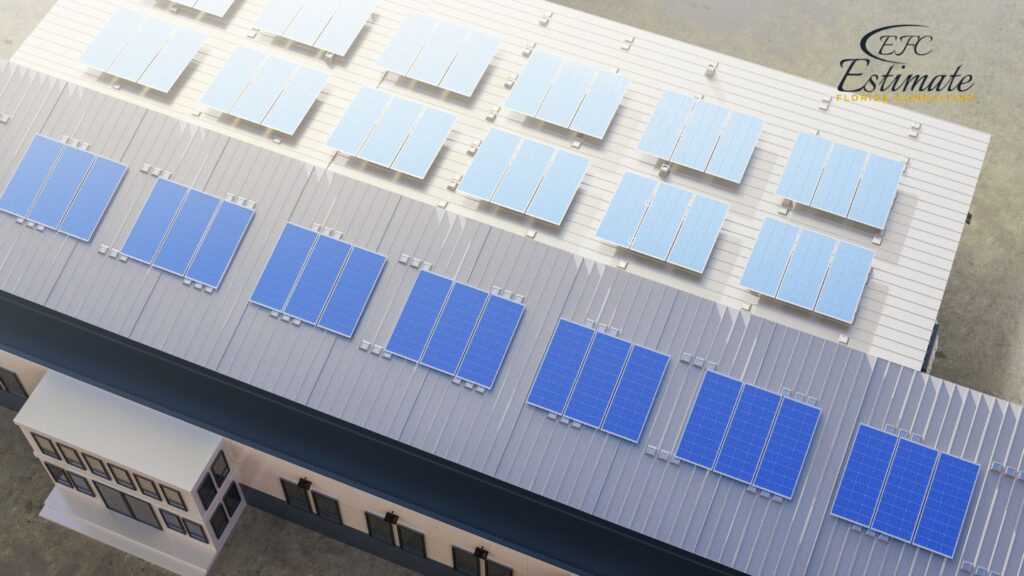
Additionally, inspectors verify the integrity of electrical connections to ensure that the system is operating safely and efficiently. The mounting system is also inspected to confirm that it remains securely anchored to the roof, preventing any structural issues or damage. Regular inspections are an essential part of proactive maintenance, helping to identify and address potential problems before they escalate.
Over time, solar panels can accumulate a variety of debris, including dust, leaves, bird droppings, and snow, depending on the location and climate. These accumulations can hinder the panels’ ability to capture sunlight effectively, reducing their overall efficiency. To maintain optimal performance, it is advisable to clean the solar panels periodically.
Cleaning schedules may vary based on environmental factors. For example, regions with heavy pollen counts or frequent storms may require more frequent cleaning. While rain can help naturally clean the panels to some extent, additional cleaning may be necessary, especially in drier climates where rain is less frequent. Cleaning solar panels typically involves using gentle cleaning solutions and soft brushes to avoid damaging the surface of the panels. Proper cleaning helps ensure that the panels can continue generating electricity at their maximum capacity.
Many modern solar roofing systems are equipped with advanced monitoring technology, allowing homeowners and businesses to track the energy production of their solar panels in real-time. This technology provides valuable insights into the system’s performance and efficiency.
One of the key advantages of system monitoring is its ability to alert system owners to any drops in efficiency. If the monitoring system detects a decrease in energy production, it can serve as an early warning sign of potential issues within the solar roofing system. This proactive alert system enables owners to take action promptly, whether it involves cleaning the panels, addressing electrical issues, or conducting more in-depth maintenance. By leveraging system monitoring, owners can ensure that their solar roofing system consistently operates at its highest efficiency, maximizing energy production and cost savings over time.
Solar roofing systems, like any other technology, can experience issues over time. Among the most common issues faced by these systems are inverter failures and connection problems. Inverters are crucial components that convert the direct current (DC) electricity generated by the solar panels into the alternating current (AC) electricity used in homes and businesses. When inverters fail or experience issues, it can disrupt the entire system’s operation and lead to decreased energy production.
Connection problems, which can involve loose or damaged electrical connections, can also impact the efficiency and safety of the solar roofing system. Faulty connections can result in electrical outages or, in some cases, pose fire hazards. It is essential to promptly identify and address these common issues to maintain the overall performance and safety of the system.
Solar panel and inverter warranties provide valuable protection for system owners. Solar panel warranties typically span 25 to 30 years, guaranteeing a certain level of performance over the system’s lifespan. These warranties offer peace of mind, ensuring that your investment in solar panels will continue to generate electricity effectively for decades. Inverter warranties, on the other hand, usually range from 5 to 15 years, depending on the manufacturer and type of inverter.
These warranties are designed to cover defects and ensure that the components continue to operate as intended.
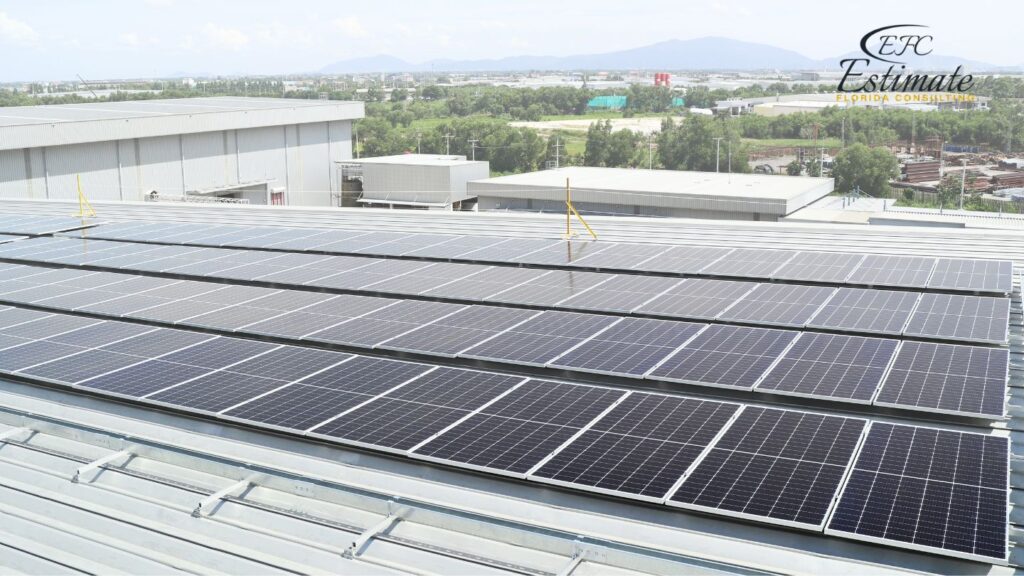
If a solar panel or inverter fails within the warranty period, the manufacturer typically provides a replacement or covers the cost of repairs. It is crucial for system owners to understand the terms and conditions of their warranties and to keep documentation for easy reference in case issues arise.
Some solar panel manufacturers and installation companies offer service plans as an additional option. These service plans often include regular maintenance, inspections, and repairs as part of a comprehensive package. Opting for a service plan can be a wise investment for solar system owners, as it extends the system’s lifespan and ensures that it consistently runs at peak efficiency.
Service plans can help prevent issues before they occur by addressing potential problems during routine maintenance and inspections.
They offer convenience and peace of mind, knowing that a team of professionals is regularly monitoring and servicing your solar roofing system. By proactively maintaining the system, service plans can maximize energy production, extend the life of your components, and provide you with a hassle-free solar experience.
The expected lifespan of solar panels is around 25 to 30 years, but with proper maintenance, many systems continue to function effectively beyond this period. The inverters and mounting hardware may have shorter lifespans and could require replacement or upgrades to maintain the system’s overall efficiency.
So, why wait? Send us your plans and give us a call now. Let’s make your project a success together!

Solar roofing projects for warehouses are a cost-effective way to reduce energy costs and support sustainability. Estimating project costs involves various factors, but long-term savings and incentives make it financially attractive. Proactive maintenance, addressing common issues, and leveraging warranties ensure system longevity.
Solar roofing systems typically last 25 to 30 years, and with proper care, they continue to provide clean energy and financial benefits. This makes them a valuable investment for warehouses and the environment.
The cost of a solar roofing project can vary based on several factors, including the size of the roof in square feet, the type of solar roofing material chosen (such as solar roof shingles or traditional solar panels), the brand and style of the solar roofing product, the complexity of the installation, and the amount of kW (kilowatts) required to meet the energy needs of the warehouse.
On average, the cost of installing solar roof shingles on a warehouse building ranges from $50,400 to $96,000+ before tax credits. The actual cost may vary depending on factors such as roof size, brand, style, and kW required.
Yes, solar roof shingles generally come at a higher cost compared to traditional solar panels. The cost of solar roof shingles ranges from $25 to $48 per square foot installed or $4.80 to $16.80 per watt, while traditional solar panels typically range from $12,000 to $36,000+ before tax credits.
Installing solar roofing on a warehouse building offers numerous benefits, including reducing reliance on traditional energy sources, lowering utility expenses over time, contributing to environmental conservation by harnessing solar energy, and potentially increasing the property value.
At Estimate Florida Consulting, we specialize in providing comprehensive estimates for solar roofing projects tailored specifically for warehouse buildings. Our estimates take into account factors such as roof size, type of solar roofing material, brand, style, complexity of installation, and kW required. Contact us for a detailed and accurate estimate based on your specific needs and requirements.
Here I am going to share some steps to get your solar roofing project for warehouses estimate report.
You can send us your plan on info@estimatorflorida.com
Before starting your project, we send you a quote for your service. That quote will have detailed information about your project. Here you will get information about the size, difficulty, complexity and bid date when determining pricing.
Our team will takeoff and estimate your project. When we deliver you’ll receive a PDF and an Excel file of your estimate. We can also offer construction lead generation services for the jobs you’d like to pursue further.



561-530-2845
info@estimatorflorida.com
Address
5245 Wiles Rd Apt 3-102 St. Pete Beach, FL 33073 United States
561-530-2845
info@estimatorflorida.com
Address
5245 Wiles Rd Apt 3-102 St. Pete Beach, FL 33073 United States
All copyright © Reserved | Designed By V Marketing Media | Disclaimer